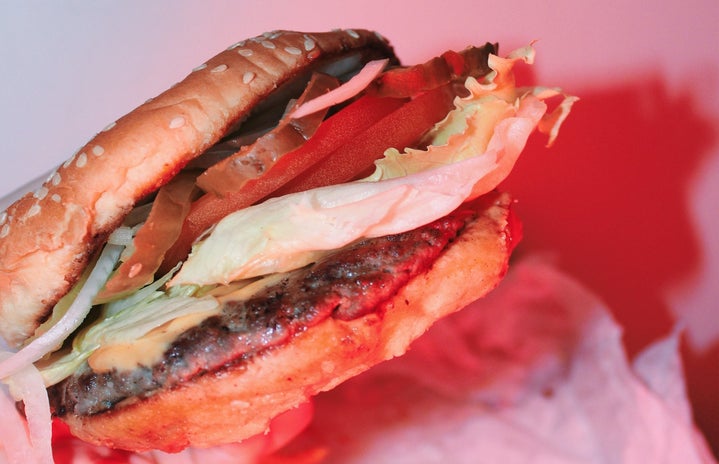I was born with 24 food allergies, including gluten, dairy, eggs, and nuts. When I was younger, the many allergen-free meals that can be found today were much more primitive, so one of the only things I could eat as part of a balanced meal was red meat. Also, literally no one in my family is a vegetarian, so I was never told not to eat it. When I ate out, a lot of times my only option was a burger without a bun.
But as I got older, I began to hear more about the environmental consequences of eating red meat. Raising livestock requires large amounts of oats and corn to be grown to feed the animals, pollutes water sources, and uses 2,500 gallons of water to produce just one pound of meat. In addition, when land is converted into farmland, its biodiversity often decreases.
Farmlands can also have consequences further from its source. Fertilizers can lead to runoff into water bodies, which can end up with an excess of nutrients. This causes algae to grow excessively, forming algal blooms, and leads to low oxygen conditions, causing marine organisms to die off. Furthermore, farm animals, particularly cows, emit greenhouse gases such as methane, contributing to global warming. Overall, there are many scary consequences of eating red meat without even getting into the health implications.

Giving up meat does have a positive environmental impact, but we have to remember it isn’t as simple as “everyone needs to become a vegetarian and climate change will rapidly slow.” Although animals raised for livestock are responsible for 13-18% of global greenhouse emissions, energy released as fossil fuels is responsible for 64%, so it does not have quite the same global implication.
Also, not all forms of meat and dairy are created equal, even within the category of red meat. Organic and grass-fed beef, for example, generally contributes less to energy consumption and eutrophication (excessive nutrients in a body of water). Lamb actually emits more carbon dioxide than beef does. Protein sources such as turkey, chicken, and tuna generally have the lowest carbon footprint.
Reducing our meat intake is a crucial step to take in fighting climate change, but it doesn’t have to be the only one. I avoid eating meat once a week, and I once tried being vegan for a week, which I plan to do again. I’ve found that once you even try to limit your meat intake a little, it becomes easier in general. I’ve lost my taste for it a bit, although hamburgers are still my weakness. Focusing on avoiding meat once a week actually has led to me eating less meat on other days of the week. Although this doesn’t sound like much and there are vegans all over doing much more than me, it is important to remember that every bit helps.
Doing something small is so much better than doing nothing. Eat turkey instead of beef. Become a pescatarian. Buy organic meat. Or if you feel up to it, go vegan, but remember there are plenty of other ways to fight climate change and we have to focus on many of them in order to slow the effects, not just focus on one.
Don’t beat yourself up over every little thing, and remember we need to work together to save our planet.
Want to keep up with HCBU? Make sure to like us on Facebook, follow us on Instagram, check out our Pinterest board, and read our latest Tweets!




